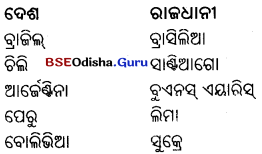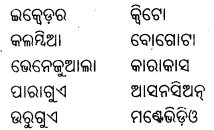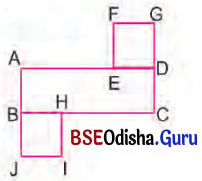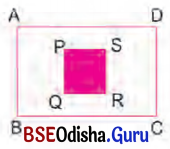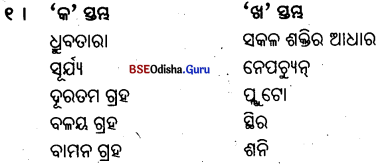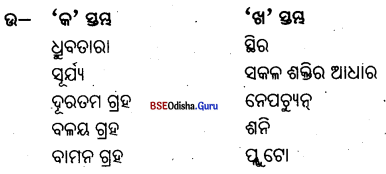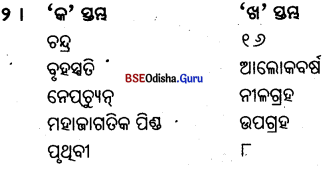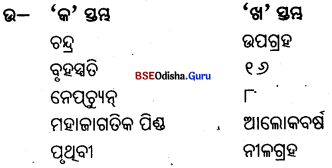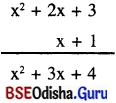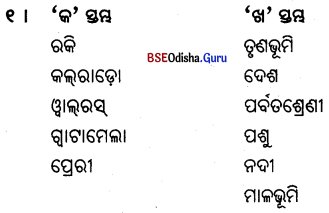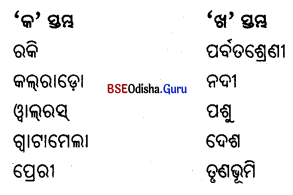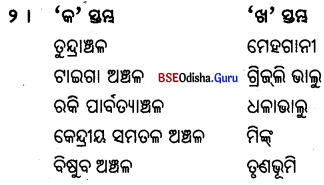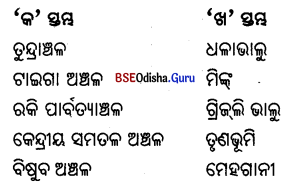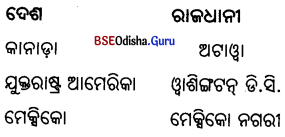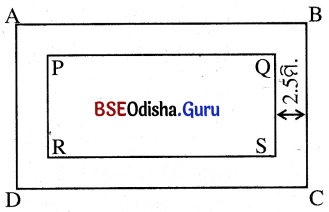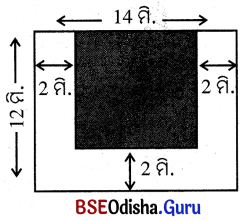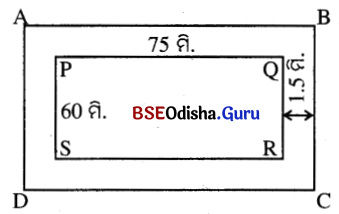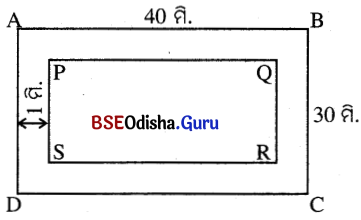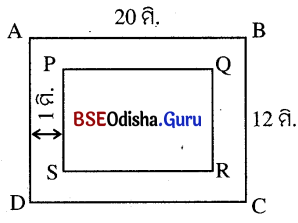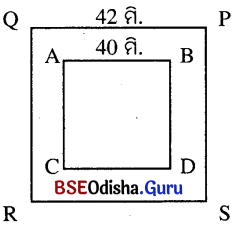Odisha State Board BSE Odisha 10th Class Odia Solutions Chapter 18 କୋଣାର୍କ Textbook Exercise Questions and Answers.
BSE Odisha Class 10 Odia Solutions Chapter 18 କୋଣାର୍କ
ପରୀକ୍ଷା ଉପଯୋଗୀ ଅତିରି
ନିର୍ଦ୍ଦିଷ୍ଟ ଉତ୍ତରମୂଳକ ପ୍ରଶ୍ନୋତ୍ତର
Question ୧।
‘କୋଣାର୍କ’ ଏକାଙ୍କିକାରେ କେଉଁ ପ୍ରସଙ୍ଗ ନାଟ୍ୟାୟିତ ?
Answer:
କୋଣାର୍କ ମନ୍ଦିରର ଦଧନଉତି କହିବା ପ୍ରସଙ୍ଗ ନାଟ୍ୟାୟିତ ।
Question ୨।
ନରସିଂହ ଦେବ କେଉଁଠି ଉଦିତ ସୂର୍ଯ୍ୟଙ୍କୁ ନମସ୍କାର କଲେ ?
Answer:
ନରସିଂହ ଦେବ ଚନ୍ଦ୍ରଭାଗା ତୀରରେ ଉଦିତ ସୂର୍ଯ୍ୟଙ୍କୁ ନମସ୍କାର କଲେ ।
Question ୩ ।
ଧରମା ମା କେତେ ଦିଅଁ ପୂଜା କରି ଧରମାକୁ ପାଇଛନ୍ତି ବୋଲି କହିଲେ ?
Answer:
ଧରମା ମା ଲକ୍ଷେ ଦିଅଁ ପୂଜି ଧରମାକୁ ପାଇଛନ୍ତି ବୋଲି କହିଲେ ।

Question ୪।
‘‘ଛାମୁଁ ସୌନ୍ଦର୍ଯ୍ୟର ପୂଜାରୀ’’– ଏହା କାହାର ଭକ୍ତି ?
Answer:
ଏହା ଶିବେଇ ସାନ୍ତରାର ଉକ୍ତି
Question ୫।
ଶୁଭ ପ୍ରଭାତରେ ରାଜାଙ୍କ କେଉଁ କଥା
Answer:
ମା’ଙ୍କ ଶେଷ ଇଚ୍ଛା ପୂରଣ କରିବା କଥା ମନେ ପଡ଼ିଲା
Question ୬।
ଛାୟା ମହାଦେବୀ କିଏ ?
Answer:
ନରସିଂହ ଦେବଙ୍କ ମାଆ ହେଉଛନ୍ତି ଛାୟା ମହାଦେବା ।
Question ୭।
ଉତ୍କଳରେ କେଉଁ ଦେବତାଙ୍କ ମନ୍ଦିର ନିର୍ମିତ ହୋଇନାହିଁ ବୋଲି ରାଜା
Answer:
ଉତ୍କଳରେ ସୂର୍ଯ୍ୟଦେବତାଙ୍କ ମନ୍ଦିର ନିର୍ମିତ ହୋଇନାହିଁ ବୋଲି ରାଜା
Question ୮।
ଶାସ୍ତ୍ର କିଏ ?
Answer:
ଶ୍ରୀକୃଷ୍ଣଙ୍କ ପୁତ୍ର ଶାମ୍ବ ଅଟନ୍ତି ।
Question ୯।
ଶାମ୍ବ କେଉଁ ରୋଗାକ୍ରାନ୍ତ ଥିଲେ ?
Answer:
ଶାମ୍ବ ଦୁରାରୋଗ୍ୟ କୁଷ୍ଠ ବ୍ୟାଧିରେ ଆକ୍ରାନ୍ତ ଥିଲେ ।
Question ୧୦ ।
ଶାମ୍ବ କେଉଁ ଦେବତାଙ୍କୁ ପୂଜା କରି ରୋଗମୁକ୍ତ ହେଲେ ?
Answer:
ଶାମ୍ବ ସୂର୍ଯ୍ୟ ଦେବତାଙ୍କୁ ପୂଜା କରି ରୋଗମୁକ୍ତ ହେଲେ ।

Question ୧୧ ।
‘‘ସୂର୍ଯ୍ୟଦେବ ସ୍ୱୟଂ ନାରାୟଣ’’– ଏହା କିଏ କହିଛନ୍ତି ?
Answer:
“ ସୂର୍ଯ୍ୟଦେବ ସ୍ୱୟଂ ନାରାୟଣ’’ – ଏହା ରାଜା ନରସିଂହ ଦେବ କହିଛନ୍ତି ।
Question ୧୨ ।
ରାଜା ମନ୍ଦିରତୋଳା ଦାୟିତ୍ଵ କାହା ଉପରେ ଅର୍ପଣ କଲେ ?
Answer:
ରାଜା ମନ୍ଦିରତୋଳା ଦାୟିତ୍ଵ ଶିବେଇ ସାନ୍ତରା ଉପରେ ଅର୍ପଣ କଲେ ।
Question ୧୩ ।
କେଉଁ ଗଣ୍ଡ ଉପରେ ମନ୍ଦିର ତୋଳା ହେବାକୁ ସ୍ଥିର ହେଲା ?
Answer:
ପଦ୍ମତେଳା ଗଣ୍ଡ ଉପରେ ମନ୍ଦିର ତୋଳା ହେବାକୁ ସ୍ଥିର ହେଲା ।
Question ୧୪ ।
ଧରମା ବାପା କିଏ ?
Answer:
ବିଶୁ ମହାରଣା ଧରମାର ବାପା ଅଟନ୍ତି ।
Question ୧୫ ।
ଧରମା ବାପା କେତେ ବର୍ଷ ହେଲା ଘରୁ ଯାଇଛନ୍ତି ?
Answer:
ଧରମା ବାପା ବାର ବର୍ଷ ହେଲା ଘରୁ ଯାଇଛନ୍ତି ।
Question ୧୬ ।
‘‘ଚନ୍ଦ୍ରଭାଗାଠି ମହାରାଜା ଦେଉଳ ତୋଳାଉଛନ୍ତି? ଏହା କିଏ କହିଚି ?
Answer:
‘ଚନ୍ଦ୍ରଭାଗାଠି ମହାରାଜା ଦେଉଳ ତୋଳାଉଛନ୍ତି’’ – ଏହା ଆଗନ୍ତୁକ କହିଚି ।
Question ୧୭ ।
ଦେଉଳ ତୋଳା କେତେ ବର୍ଷ ଧରି ଚାଲିଛି ?
Answer:
ଦେଉଳ ତୋଳା ବାରବର୍ଷ ଧରି ଚାଲିଛି ।
Question ୧୮ ।
କେତେଜଣ ବଢ଼େଇ ଦେଉଳ ତୋଳାରେ ଲାଗିଛନ୍ତି ?
Answer:
ବାରଶହ ବଢେଇ
Question ୧୯ ।
ଦେଉଳର କେଉଁଟି ବସି ପାରି ନାହିଁ ?
Answer:
ଦେଉଳର ଦଧନଉତିଟି ବସି ପାରି ନାହିଁ ।
Question ୨୦ ।
‘‘ଚକାଡ଼ୋଳା ହେ, ତୁମରି ଇଚ୍ଛା ପୂର୍ଣ ହେଉ ।’’ –ଏହା କାହାର ଉକ୍ତି ?
Answer:
‘ଚକାଡ଼ୋଳା ହେ, ତୁମରି ଇଚ୍ଛା ପୂର୍ଣ ହେଉ ।’ –ଏହା ଆଗନ୍ତୁକର ଉକ୍ତି ।

Question ୨୧ ।
ଧରମାକୁ କିଏ ସାହା ହେବ ବୋଲି ସେ ତା ମାଆକୁ କହିଚି ?
Answer:
ବଡ଼ ଠାକୁର ସାହା ହେବେ ବୋଲି ସେ ତା ମାଆକୁ କହିଚି ।
Question ୨୨ ।
କାହାକୁ ସୁମରଣା କରି ଅନୁକୂଳ କରି ଯିବାକୁ ମା ଧରମାକୁ କହିଲେ
Answer:
ମଙ୍ଗଳା ମା’ଙ୍କୁ ସୁମରଣା କରି ଅନୁକୂଳ କରି ଯିବାକୁ ମା ଧରମାକୁ କହିଲେ ।
Question ୨୩ ।
ଧରମା କ’ଣ ନେଇ ବାପାଙ୍କ ନିକଟକୁ ଗଲା ?
Answer:
ଧରମା ବାଡ଼ିର କୋଳି ଓ ମୁଦି ନେଇ ବାପାଙ୍କ ନିକଟକୁ ଗଲା ।
Question ୨୪ ।
‘‘ଏ ବାରଶ’ ବଢ଼େଇରେ ଦାୟ ନା ପୁଅରେ ଦାୟ ?’’ – ଏହା କାହାର ଉକ୍ତି ?
Answer:
‘‘ଏ ବାରଶ’ ବଢ଼େଇରେ ଦାୟ ନା ପୁଅରେ ଦାୟ ?’’
Question ୨୫ ।
ଧରମା ଶେଷରେ କେଉଁଠି ଝାସ ଦେଇଛି ?
Answer:
ଧରମା ଶେଷରେ ସମୁଦ୍ରରେ ଝାସ ଦେଇଛି ।

ବିଗତ ବର୍ଷର ହାଇସ୍କୁଲ ପରୀକ୍ଷା (ବାର୍ଷିକ ଓ ସପ୍ଲିମେଣ୍ଟାରୀ)ର ପ୍ରଶ୍ନୋତ୍ତର
Question 1.
‘ହେଲେ, ଯାହାର ମୁଣ୍ଡ ନାହିଁ, ତା’ ପିଣ୍ଡରେ ଜୀବନ କୁଆଡୁ ଆସିବ ?’’ – ଏହା କାହାର ଉକ୍ତି ?
Answer:
ବିଶୁ ମହାରଣାର
Question 2.
ସୂର୍ଯ୍ୟମନ୍ଦିର ନିର୍ମାଣ ଦାୟିତ୍ଵ ରାଜା କାହା ଉପରେ ନ୍ୟସ୍ତ କରିଥିଲେ ?
Answer:
ଶିବେଇ ସାନ୍ତ୍ରରା
Question 3.
ରାଜା ନରସିଂହଦେବ ତାଙ୍କର କେଉଁ କଥା ଜୀବନସାରା ଅପାସୋରା ରହିଯିବ ବୋଲି କହିଥିଲେ ?
Answer:
ଚନ୍ଦ୍ରଭାଗାରେ ସୂର୍ଯେର୍ଯ୍ୟାଦୟ କଥା
Question 4.
‘ଜିଇବଞ୍ଚି ତୁ ଯୁଗରାଇଜ କର, ତୋ ବାପର ନାଁ ରଖ ।’ ଏ ଉକ୍ତିଟି କାହାର ?
Answer:
ଧରମା ମାଆର
Question 5.
ବିଶ୍ୱକର୍ମା କାହାକୁ ‘କୁମାର’ ବୋଲି ସମ୍ବୋଧନ କରିଛନ୍ତି ?
Answer:
କାର୍ତ୍ତିକେୟଙ୍କୁ

Question 6.
‘ଚକାଡୋଳା ହେ, ତୁମରି ଇଚ୍ଛା ପୂର୍ଣ୍ଣ ହେଉ’ – ଏକଥା କିଏ କହିଛି ?
Answer:
ଆଗନ୍ତୁକ
Question 7.
ଧରମା କ’ଣ ଦେଖାଇ ବିଶୁ ମହାରଣାକୁ ପୁତ୍ରର ପରିଚୟ ଦେଇଥୁଲା ?
Answer:
ବାଢ଼ିର କୋଳି ଓ ମୁଦି
Question 8.
ନରସିଂହଦେବ କେଉଁଠାରେ ମନ୍ଦିର ତୋଳିବାର ଦାୟିତ୍ଵ ଶିବେଇଙ୍କୁ ଦେଇଥିଲେ ?
Answer:
ପଦ୍ମତୋଳା ଗଣ୍ଡ ଉପରେ
Question 9.
ନରସିଂହଦେବ କେଉଁ ବଂଶର ଦାୟାଦ ଥିଲେ ?
Answer:
ବାଡ଼ିର କୋଳି ଓ ମୁଦି
Question 10.
‘‘ଏକା ଧରମା ମରିଗଲେ କିଛି କ୍ଷତି ନାହିଁ । ସବୁଦିନକୁ ଏ ଶିଳ୍ପୀକୁଳ ବଞ୍ଚିରହୁ ।’’– ଏହା କାହାର ଉକ୍ତି ?
Answer:
ଧରମାର
Question 11.
କିଏ ସୁର୍ଯ୍ୟପୂଜା କରି ମହାବ୍ୟାଧ୍ କୁଷ୍ଠରୋଗରୁ ରକ୍ଷା ପାଇଥିଲେ ?
Answer:
ଶାମ୍ନ
Question 12.
ଦେଉଳର ମୁଣ୍ଡିମାରି ନ ପାରିଲେ ବାରଶହ ବଢ଼େଇଙ୍କର ମୁଣ୍ଡକାଟ ହେବା ଖବର ଧରମା ଘରେ କିଏ ହେଇଥିଲେ ?
Answer:
ଆଗନ୍ତୁକ
Question 13.
ନରସିଂହଦେବ କେଉଁ ଦେବତାଙ୍କୁ ସ୍ଵୟଂ ନାରାୟଣ ବୋଲି କହିଛନ୍ତି ?
Answer:
ସୂର୍ଯ୍ୟ
Question 14.
ଶାମ୍ବ ସୂର୍ଯ୍ୟପୂଜା କରିଥିଲେ କାହିଁକି ?
Answer:
କୁଷ୍ଠବ୍ୟାଧୁରୁ ମୁକ୍ତ ହେବାପାଇଁ
Question 15.
‘ଦେଉଳର ଘନ କେନ୍ଦ୍ର ସହିତ ଦଧ୍ଵନଉତି ଗୋଟିଏ ସରଳରେଖାରେ ରହିପାରୁନି ।’ – ଏକଥା କିଏ ଭାବିଥିଲା ?
Answer:
ଧରମା
ପରୀକ୍ଷା ଉପଯୋଗୀ ଅତିରିକ୍ତ ପ୍ରଶ୍ନୋତ୍ତର
(A) ଗୋଟିଏ ବାକ୍ୟରେ ଉତ୍ତର ଦିଅ ।
Question 1.
ଲେଖକ ଭଞ୍ଜକିଶୋର କେବେ ଜନ୍ମଗ୍ରହଣ କରିଥିଲେ ?
Answer:
ଲେଖକ ଭଞ୍ଜକିଶୋର ୧୯୨୨ ମସିହାରେ ଜନ୍ମଗ୍ରହଣ କରିଥିଲେ ।
Question 2.
ନରସିଂହଦେବ କାହାକୁ ନମସ୍କାର କଲେ ?
Answer:
ନରସିଂହଦେବ ସୂର୍ଯ୍ୟଙ୍କୁ ନମସ୍କାର କଲେ ।

Question 3.
ନରସିଂହଦେବଙ୍କର କେତେବେଳେ ମା’ଙ୍କର ଶେଷ ଇଚ୍ଛା କଥା ମନେପଡ଼ିଲା ?
Answer:
ନରସିଂହଦେବଙ୍କର ଶୁଭ ପ୍ରଭାତରେ ମା’ଙ୍କର ଶେଷ ଇଚ୍ଛା କଥା ମନେପଡ଼ିଲା ।
Question 4.
ସୂର୍ଯ୍ୟ ପୂଜା କରି କିଏ କୁଷ୍ଠ ବ୍ୟାଧିରୁ ମୁକ୍ତ ହୋଇଥିଲେ ?
Answer:
ସୂର୍ଯ୍ୟ ପୂଜା କରି ଶାମ୍ବ କୁଷ୍ଠ ବ୍ୟାଧରୁ ମୁକ୍ତ ହୋଇଥିଲେ ।
Question 5.
‘ସମ୍ରାଟ ପରମ ଧାର୍ମିକ’’
Answer:
‘ସମ୍ରାଟ ପରମ ଧାର୍ମିକ’’
Question 6.
ଛାୟା ମହାଦେବୀ କିଏ ?
Answer:
ନରସିଂହଦେବଙ୍କ ମାଆ ଥିଲେ ଛାୟା ମହାଦେବୀ ।
Question 7.
ସୂର୍ଯ୍ୟ ମନ୍ଦିର ନିର୍ମାଣ କାର୍ଯ୍ୟରେ କେତେ କାରିଗର ଲାଗିଥିଲେ ?
Answer:
ସୂର୍ଯ୍ୟ ମନ୍ଦିର ନିର୍ମାଣ କାର୍ଯ୍ୟରେ ବାରଶହ କାରିଗର ଲାଗିଥିଲେ ।
Question 8.
କାରିଗରମାନଙ୍କ ମଧ୍ୟରେ ଶ୍ରେଷ୍ଠ କାରିଗର କିଏ ଥିଲେ ?
Answer:
କାରିଗରମାନଙ୍କ ମଧ୍ୟରେ ଶ୍ରେଷ୍ଠ କାରିଗର ଥିଲେ ବିଶୁ ମହାରଣା ।
Question 9.
ଧରମା କିଏ ?
Answer:
ଧରମା ବିଶୁ ମହାରଣାର ଏକମାତ୍ର ପୁଅ ଥିଲେ ।
Question 10.
ବାରଶ’ ବଢ଼େଇଙ୍କ ମୁଣ୍ଡକାଟ ହେବା କଥା ଧରମା ମା’ କାହାଠାରୁ ଶୁଣିଲେ ?
Answer:
ବାରଶ’ ବଢ଼େଇଙ୍କ ମୁଣ୍ଡକାଟ ହେବା କଥା ଧରମା ମା’ ଆଗନ୍ତୁକଙ୍କଠାରୁ ଶୁଣିଲେ ।
Question 11.
କାଇଁକି ମୁଁ ପରା ଅଛି – ଏକଥା କିଏ କାହାକୁ କହିଛି ?
Answer:
କାଇଁକି ମୁଁ ପରା ଅଛି – ଏକଥା ଧରମା ତା’ର ମା’କୁ କହିଛି ।
Question 12.
ହେ ପ୍ରଭୁ, ପୋଡ଼ା ଭାଗ୍ୟରେ ଏଇୟା ଥିଲା ଏକଥା କିଏ କହିଛି ?
Answer:
ହେ ପ୍ରଭୁ, ପୋଡ଼ା ଭାଗ୍ୟରେ ଏଇୟା ଥିଲା – ଏକଥା ଧରମା ମା’ କହିଛି ।

Question 13.
କେଉଁ ନଦୀର ତୀର ନିକଟରେ କୋଣାର୍କ ମନ୍ଦିର ରହିଛି ?
Answer:
ଚନ୍ଦ୍ରଭାଗା ନଦୀର ତୀର ନିକଟରେ କୋଣାର୍କ ମନ୍ଦିର ରହିଛି ।
Question 14.
ଆଉଥରେ ମୋତେ ବାବା ବୋଲି ଡାକ – ଏକଥା କିଏ କାହାକୁ କହିଛି ?
Answer:
ଆଉଥରେ ମୋତୋ ବାପା ବୋଲି ଡାକ – ଏକଥା ବିଶୁ, ଧରମାକୁ କହିଛି ।
Question 15.
ଯାହାର ମୁଣ୍ଡ ନାହିଁ, ତା’ ପିଣ୍ଡରେ କ’ଣ ସମ୍ଭବ ନୁହେଁ ?
Answer:
ଯାହାରୁ ମୁଣ୍ଡ ନାହିଁ, ତା’ ପିଣ୍ଡରେ ଜୀବନ ସମ୍ଭବ ନୁହେଁ ।
Question 16.
ବିଷ୍ଣୁ, ତୁ କ’ଣ ପାଗଳ – ଏକଥା କିଏ କାହାକୁ କହିଛନ୍ତି ?
Answer:
ବିଶୁ, ତୁ କ’ଣ ପାଗଳ ଏକଥା ଶିଳ୍ପୀଗଣ ବିଶୁକୁ କହିଛନ୍ତି ।
Question 17.
ମୋରି ପୁଅ ବୋଲି ତୁ ବାପର ତ୍ରୁଟି ସୁଧାରି ପାରିବୁ । – ଏକଥା କିଏ କାହାକୁ କହିଥିଲେ ?
Answer:
ଏକଥା ବିଶୁ ମହାରଣା ନିଜ ପୁଅ ଧରମାକୁ କହିଥିଲେ ।
Question 18.
ବିଶୁର କେଉଁ ବାହୁ ଘନ ଘନ କମ୍ପି ଉଠୁଥୁଲା ?
Answer:
ବିଶୁର ଦକ୍ଷିଣ ବାହୁ ଘନ ଘନ କମ୍ପି ଉଠୁଥିଲା ।
Question 19.
ଆମର ଖାଇ ପିଇ ଶୋଇ ପଡ଼ିବା ଚାଲ – ଏକଥା କିଏ କହିଛି ?
Answer:
ଆମର ଖାଇ ପିଇ ଶୋଇ ପଡ଼ିବା ଚାଲ – ଏକଥା ତୃତୀୟ ଶିଳ୍ପୀ କହିଛି ।
Question 20.
ମତେ ଖାଲି ଥରେ ସୁଯୋଗ ଦିଅ ଏକଥା କିଏ କାହାକୁ କହିଛି ?
Answer:
ମତେ ଖାଲି ଥରେ ସୁଯୋଗ ଦିଅ ଏକଥା ଧରମା, ବିଶୁକୁ କହିଛି ।
Question 21.
କାଲି ସକାଳୁ କାହାକୁ ସୁମରଣା କରି ଯିବୁ ଧରମାକୁ ତା’ ମା’ କହିଥିଲା ?
Answer:
କାଲି ସକାଳୁ ମଙ୍ଗଳା ମା’ଙ୍କୁ ସୁମରଣା କରି ଯିବୁ ବୋଲି ଧରମାକୁ ତା’ ମା’ କହିଥିଲା ।
Question 22.
କେଉଁଥୁରୁ ବାପାଙ୍କୁ ବଞ୍ଚାଇବାପାଇଁ ଧରମା ଯାଇଥିଲା ?
Answer:
ହାଣ ମୁହଁରୁ ବାପାଙ୍କୁ ବଞ୍ଚାଇବାପାଇଁ ଧରମା ଯାଇଥିଲା ।

Question 23.
କଥା କିପରି ପ୍ରଘଟ ହୋଇଯାଏ ?
Answer:
କଥା କାନକୁ ଦି କାନ ହୋଇ ପ୍ରଘଟ ହୋଇଯାଏ ।
Question 24.
କିଏ ପଚାରି ପଚାରି ବିଶୁ ଘରେ ପହଞ୍ଚିଲା ?
Answer:
ଆଗନ୍ତୁକ ପଚାରି ପଚାରି ବିଶୁ ଘରେ ପହଞ୍ଚିଲା ।
Question 25.
ଧରମା କାହାକୁ ଦିହ ଛୁଇଁବାକୁ କହିଥିଲା ?
Answer:
ଧରମା ତା’ର ମା’କୁ ଦିଅ ଛୁଇଁବାକୁ କହିଥିଲା ।
Question 26.
ସମ୍ରାଟ କିପରି ଲୋକ ଥିଲେ ?
Answer:
ସମ୍ରାଟ ପରମ ଧାର୍ମିକ ଓ ମହାନୁଭବ ଥିଲେ ।
Question 27.
ସୂର୍ଯ୍ୟ ବଂଶର ଦାୟାଦ କିଏ ଥିଲେ ?
Answer: ନରସିଂହଦେବ ସୂର୍ଯ୍ୟ ବଂଶର ଦାୟାଦ ଥିଲେ ।
Question 28.
କାହାର ଡାକରା ପାଇ ବିଶୁ ଘର ଛାଡ଼ି ଯାଇଥିଲା ?
Answer:
ମଣିମାଙ୍କ ଡାକରା ପାଇ ବିଶୁ ଘର ଛାଡ଼ି ଯାଇଥିଲା ।
Question 29.
କିଏ ସ୍ଵୟଂ ନାରାୟଣ ?
Answer:
ସୂର୍ଯ୍ୟଦେବ ହିଁ ସ୍ୱୟଂ ନାରାୟଣ ।
Question 30.
ମଣିମା କାହା ଉପରେ ଅତୁଟ ବିଶ୍ଵାସ ରଖୁଥିଲେ ?
Answer:
ମଣିମା ଶିବେଇ ସାନ୍ତରା ଉପରେ ଅତୁଟ ବିଶ୍ଵାସ ରଖୁଥିଲେ ।
(B) ଗୋଟିଏ ପଦ ବା ଶବ୍ଦରେ ଉତ୍ତର ଦିଅ ।
Question 1.
‘କୋଣାର୍କ’ ଏକାଙ୍କିକାରେ କେଉଁ ପ୍ରସଙ୍ଗ ନାଟ୍ୟାୟିତ ହୋଇଛି ?
Answer:
ମନ୍ଦିର ଦଧନଉତି ବସିବା
Question 2.
ବାଳକ ଧରମା କାହା ପାଇଁ ଆୟୋତ୍ସର୍ଗ କରିଥିଲେ ?
Answer:
ଜାତି ପାଇଁ
Question 3.
ଭଞ୍ଜକିଶୋର ପଟ୍ଟନାୟକ କେଉଁ ଗ୍ରାମରେ ଜନ୍ମଗ୍ରହଣ କରିଥିଲେ ?
Answer:
ଛାଣିପୁରରେ
Question 4.
ନରସିଂହଦେବ କାହାକୁ ନମସ୍କାର କରୁଥିଲେ ?
Answer:
ସୂର୍ଯ୍ୟଙ୍କୁ

Question 5.
ନରସିଂହଦେବ କେଉଁ ସ୍ଥାନରେ ସୂର୍ଯ୍ୟଙ୍କୁ ନମସ୍କାର କରୁଥିଲେ ?
Answer:
ଚନ୍ଦ୍ରଭାଗା ତୀରରେ
Question 6.
ନରସିଂହଦେବ କେଉଁ ସମୟରେ ସୂର୍ଯ୍ୟଙ୍କୁ ନମସ୍କାର କରୁଥିଲେ ?
Answer:
ସୂର୍ଯ୍ୟୋଦୟ୍ଟରେ
Question 7.
ସୂର୍ଯ୍ୟୋଦୟରେ ନରସିଂହଦେବ ସୂର୍ଯ୍ୟଙ୍କୁ ନମସ୍କାର କରୁଥିବାବେଳେ ତାଙ୍କ ପାଖରେ କିଏ ଛିଡ଼ା ହୋଇଥିଲେ ?
Answer:
ଶିବେଇ ସାନ୍ତରା
Question 8.
କେଉଁ ଦୃଶ୍ୟକୁ ଏକ ଅପୂର୍ବ ଦୃଶ୍ୟ ବୋଲି ନରସିଂହଦେବ କହିଛନ୍ତି ?
Answer:
ସୂର୍ଯ୍ୟୋଦୟର ଦୃଶ୍ୟ
Question 9.
ସୂର୍ଯ୍ୟଦେବ କେଉଁଠାରୁ ଲମ୍ଫ ପ୍ରଦାନ କରି ଉଦିତ ହେଉଛନ୍ତି ବୋଲି ନରସିଂହଦେବ କହିଛନ୍ତି ?
Answer:
ସମୁଦ୍ରରୁ
Question 10.
କେଉଁ ଦୃଶ୍ୟ ନରସିଂହଦେବଙ୍କ ଜୀବନର ଅପାସୋରା ହୋଇ ରହିଯିବ ବୋଲି ସେ କହିଛନ୍ତି ?
Answer:
ସୂର୍ଯ୍ୟୋଦୟର
Question 11.
ପ୍ରଭାତକାଳରେ ନରସିଂହଦେବଙ୍କର କେଉଁ କଥା ମନେପଡ଼ିଥିଲା ?
Answer:
ମା’ଙ୍କର ଶେଷ ଇଚ୍ଛା
Question 12.
ଛାୟା ମହାଦେବୀଙ୍କର ଶେଷ ଇଚ୍ଛା କ’ଣ ଥିଲା ?
Answer:
ଚନ୍ଦ୍ରଭାଗା ତୀରରେ ସୂର୍ଯ୍ୟମନ୍ଦିର ପ୍ରତିଷ୍ଠା
Question 13.
ଧରମା କିପରି ତା’ଘରକୁ ପ୍ରବେଶ କରିଥିଲା ?
Answer:
କାନ୍ଦି କାନ୍ଦି
Question 14.
ମୁଁ ପଛେ ମରିଯାଏ, ଜିଇଁବଞ୍ଚୁ ତୁ ଯୁଗ ରାଇଜ କର । ଏକଥା କିଏ କହିଛନ୍ତି ?
Answer:
Question 15.
ଅନୁକୂଳବେଳେ କାହାକୁ ସୁମରଣା କରିବାକୁ ଧରମାର ମାଆ କହିଛନ୍ତି ?
Answer:
ମଙ୍ଗଳାଙ୍କୁ
Question 16.
ଚନ୍ଦ୍ରଭାଗା ତୀରରେ କିଏ ଏକାକୀ ପଦଚାରଣା କରୁଥିଲେ ?
Answer:
ବିଶୁ ମହାରଣା
Question 17.
ବିଶୁ, ତୁ ହାରିଯାଇଛୁ ବୋଲି କିଏ ଉପହାସ କରି କହୁଥିଲା ?
Answer:
ଚୂଳବିହୀନ ମନ୍ଦିର

Question 18.
ନିହାଣ ମୁନରେ ଓଡ଼ିଆ କାରିଗର ଯେପରି ପଥର ଦେହରେ ଜୀବନ ଦେଇଛି – ଏହା କିଏ କହିଛନ୍ତି ?
Answer:
ଧରମା
Question 19.
ଯାହାର ମୁଣ୍ଡ ନାହିଁ, ତା’ ପିଣ୍ଡରେ ଜୀବନ ଆସିବ କୁଆଡ଼ୁ ? – ଏକଥା କିଏ କହିଛନ୍ତି ?
Answer:
ବିଶୁ ମହାରଣା
Question 20.
କାରିଗର ଘରର ପିଲା ଧରମା ବେଳେ ବେଳେ କ’ଣ ଦେଖେ ବୋଲି କହିଥିଲା ?
Answer:
ପୋଥପତ୍ର
Question 21.
ମୋ ଦକ୍ଷିଣବାହୁ ଘନ ଘନ କମ୍ପିଉଠୁଛି କାହିଁକି ? ଏହା କାହାର ଉକ୍ତି ?
Answer:
ବିଶୁ ମହାରଣା
Question 22.
‘ସୂର୍ଯ୍ୟଦେବ ହିଁ ସ୍ୱୟଂ ନାରାୟଣ’ ଏ କଥା କିଏ କହିଥିଲେ ?
Answer:
ରାଜା ନରସିଂହଦେବ
Question 23.
ନରସିଂହଦେବ ସୌନ୍ଦର୍ଯ୍ୟର ପୂଜାରୀ ବୋଲି କିଏ କହିଛନ୍ତି ?
Answer:
ଶିବେଇ ସାନ୍ତରା
Question 24.
‘ଛାମୁ ସୌନ୍ଦର୍ଯ୍ୟର ପୂଜାରୀ’ ଏହି ଉକ୍ତିଟି କାହାର ?
Answer:
ଶିବେଇ ସାନ୍ତରା
Question 25.
ସୂର୍ଯ୍ୟଦେବଙ୍କର ଉପାସନା ପାଇଁ ଗୋଟାଏ ସୁଦ୍ଧା ମନ୍ଦିର ନାହିଁ ବୋଲି କିଏ କହିଥିଲେ ?
Answer:
ନରସିଂହଦେବ
Question 26.
‘‘ମୂଳଦୁଆରେ କେଉଁଠି କ’ଣ ଦୋଷ ରହିଯାଇଛି ବୋଲି ଭାର ସମାନ ରହୁନି’’ – ଏକଥା କିଏ କହିଥିଲେ ?
Answer:
ଧରମା
Question 27.
ସମୁଦ୍ରର କେଉଁ ଗଣ୍ଡ ଉପରେ ସୂର୍ଯ୍ୟ ମନ୍ଦିର ନିର୍ମାଣ ହେବ ବୋଲି ନରସିଂହଦେବ ନିଷ୍ପଭି ନେଇଥିଲେ ?
Answer:
ପଦ୍ମତୋଳା ଗଣ୍ଡ

Question 28.
ନିର୍ଦ୍ଦିଷ୍ଟ ଦିନ ମଧ୍ୟରେ ଦେଉଳର ଚୂଳି ମାରି ନ ପାରିଲେ କ’ଣ ହେବ ବୋଲି ରାଜା ଆଦେଶ ଦେଇଥିଲେ ?
Answer:
ମୁଣ୍ଡକାଟ
Question 29.
‘ବିଶୁ ମହାରଣାର ପୁଅ କେବେହେଲେ ହାରିବନି’ – ଏକଥା କିଏ କହିଥିଲେ ?
Answer:
ଧରମା
Question 30.
ଟିକିଛୁଆ ହୋଇ ମଧ୍ୟ କିଏ ବୀରପଣିଆ ଦେଖାଇଥିଲା ?
Answer:
ଅଭିମନ୍ୟୁ
Question 31.
ଚିହ୍ନିବାପାଇଁ ଧରମାର ମାଆ ଧରମା ହାତରେ କ’ଣ ପଠାଇଥିଲେ ?
Answer:
କୋଳି ଓ ମୁଦି
Question 32.
ବାପାର ତ୍ରୁଟିକୁ ସୁଧାରିବାରେ କିଏ ସମର୍ଥ ହୁଏ ?
Answer:
ପୁଅ
Question 33.
‘ବାରଶ’ ବଢ଼େଇରେ ଦାୟ ନା ପୁଅରେ ଦାୟ ? – ଏକଥା କିଏ କାହାକୁ ପଚାରିଥିଲେ ?
Answer:
ବଢ଼େଇମାନେ ବିଶୁ ମହାରଣାଙ୍କୁ
Question 34.
ବିଶୁ ମହାରଣା କେତେବର୍ଷ ଧରି ଘରଠାରୁ ଦୂରରେ ଥିଲା ?
Answer:
ବାର ବର୍ଷ କାଳ
Question 35.
ଓଡ଼ିଆ କାରିଗରଙ୍କ ମାନ ରଖିବାକୁ କିଏ ପଣକରି ଆସିଛି ବୋଲି କୁହାଯାଇଛି ?
Answer:
ଧରମା

Question 36.
‘‘ଶେଷଥର ପାଇଁ ମଉଜ କରିବା ଚାଲ’’ – ଏକଥା କିଏ କହିଛନ୍ତି ?
Answer:
ଜଣେ ଶିଳ୍ପୀ
Question 37.
ଭାସ୍କର କୁଳର ମଉଡ଼ମଣି କିଏ ?
Answer:
ବିଶୁ ମହାରଣା
Question 38.
ମହାରାଜାଙ୍କ ଆଦେଶ ବିଷୟରେ ଧରମା ମାଆକୁ କିଏ ଖବର ଦେଇଥିଲେ ?
Answer:
ଜନୈକ ଆଗନ୍ତୁକ
Question 39.
ଧ୍ରୁବ, ପ୍ରହ୍ଲାଦ ଟିକି ପିଲା ହୋଇ କ’ଣ ଲାଭ କରିଥିଲେ ?
Answer:
ଈଶ୍ବରଙ୍କ ସାନ୍ନିଧ୍ୟ
Question 40.
କେଉଁ ନଦୀ ତୀରରେ କୋଣାର୍କ ମନ୍ଦିର ନିର୍ମାଣ ହୋଇଛି ?
Answer:
ଚନ୍ଦ୍ରଭାଗା
(C) ଶୂନ୍ୟସ୍ଥାନ ପୂରଣ କର ।
Question 1.
ଚନ୍ଦ୍ରଭାଗା ତାରରେ ……………….. ଏକାକା ପଦଚାରଣା କରୁଥିଲୋ
Answer:
ବିଶୁ ମହାରଣା,
Question 2.
ନିହାଣ ମୁନରେ ଓଡ଼ିଆ କାରିଗର ଯେପରି ଯେପରି ପଥର ଦେହରେ ଜାବନ ଦେଇଛି – ଏହା ………………….କହିଛନ୍ତି।
Answer:
ଧରମା
Question 3.
ଯାହାର ମୁଣ୍ଡ ନାହିଁ, ତା’ ପିଣ୍ଡରେ ଜାବନ ଆସିବ କୁଆତୁ? – ଏ କଥା …………………. କହିଛିନ୍ତି ।
Answer:
ବିଶୁ ମହାରଣା
Question 4.
ମୋ ଦକ୍ଷିଣବାହୁ ଘନ ଘନ କମିଉଠୁଛି କାର୍ହିକି? ଏହି ……………… ର ଉକ୍ତ୍ରି ।
Answer:
ବିଶୁ ମହାରଣା
Question 5.
‘ସୂର୍ଯ୍ୟଦେବ ର୍ହି ସ୍ୱୟଂ ନାରାୟଣ’ – ଏ କଥା ………………… କହିଥିଲେ।
Answer:
ରାଜା ନରସିଂହଦେବ
Question 6.
ଛାମୁ ସୌଦର୍ଯ୍ୟର ପୂଜାରା – ଏକଥା …………… କହିଥ୍ ଲୋ
Answer:
ଶିବେଇ ସାନ୍ତରା
Question 7.
ସୂର୍ଯଦେବଙ୍କର ଉପାସନା ପାଇଁ ଗୋଟାଏ ସୁଘା ନାହିଁ ବୋଲି …………… କହିଥିଲେ।
Answer:
ନରସିଂହଦେବ

Question 8.
“ମୂଳପୁଆରେ କେଉଁଠି କ’ଣ ଦୋଷ ରହିଯାଇଛି ବୋଲି ଭାର ସମାନ ରହୁନି” – ଏକଥା ……………….. କହିଥ୍ ଲୋ
Answer:
ଧରମା
Question 9.
କୋଣାର୍କ ମନ୍ଦିର ରାଜା ………………..ଙ୍କର କାର୍ତ୍ତି ।
Answer:
ନରସିଂହଦେବ
Question 10.
ଚନ୍ଦ୍ରଭାଗାରେ ସୂର୍ଯ୍ୟମନ୍ଦିର ପ୍ରତିଷ୍ଠା ପାଇଁ ………………… ନରସିଂହଦେବଙ୍କୁ ଅନୁରୋଧ କରିଥିଲେ ।
Answer:
ଛାୟା ମହାଦେବୀ
Question 11.
ନରସିଂହଦେବ …………………. ବଂଶର ଦାୟାଦ ଥିଲେ ।
Answer:
ସୂର୍ଯ୍ୟ
Question 12.
ଧରମାର ପିତାଙ୍କ ନାମ ଥିଲା …………………..।
Answer:
ବିଶୁ ମହାରଣା
Question 13.
ସୂର୍ଯ୍ୟମନ୍ଦିର ନିର୍ମାଣ ପାଇଁ ………………… ଜଗ ବଢ଼େଇ ଦିନରାତି କାମରେ ଲାଗିଥ୍ ଲୋ
Answer:
ବାରଶହ
Question 14.
ବାରଶହ ବଢେଇ ……………. ବର୍ଷ ଧରି ସୂର୍ଯ୍ୟମନ୍ଦିର ନିର୍ମାଣ କରିଚାଲିଥିଲୋ
Answer:
୧୨
Question 15.
‘ବିଶୁ ମହାରଣାର ପୁଅ କେବେହେଲେ ହାରିବନି’ – ଏକଥା …………………… କହିଥିଲେ ।
Answer:
ଧରମା
Question 16.
ବାଳକ ଧରମା ……………….. ପାଇଁ ଆମ୍ବୋତ୍ସର୍ଗ କରିଥିଲେ ।
Answer:
ଜାତି

Question 17.
‘କୋଣାର୍କ’ ଏକାଙ୍କିକାର ରଚୟିତା ………………….।
Answer:
ଭଞ୍ଜକିଶୋର ପଟ୍ଟନାୟକ
Question 18.
ଛାୟା ମହାଦେବୀ ………………… ଙ୍କର ଜନନୀ ଥିଲେ ।
Answer:
ନରସିଂହଦେବ
Question 19.
ସୂର୍ଯ୍ୟଙ୍କୁ ପୂଜାକରି …………………. କୁଷ୍ଠବ୍ୟାଧରୁ ମୁକ୍ତ ହୋଇଥିଲେ ।
Answer:
ଶାମ୍ବ
Question 20.
………………….. ନରସିଂହଦେବଙ୍କ ଅତି ବିଶ୍ଵାସୀ ଥିଲେ ।
Answer:
ଶିବେଇ ସାନ୍ତରା
Question 21.
ସୂର୍ଯ୍ୟମନ୍ଦିର ନିର୍ମାଣର ଗୁରୁଦାୟିତ୍ଵ ନରଦାୟିତ୍ବ ନରସିଂହଦେବ ……………….ଙ୍କୁ ଅର୍ପଣ କରିଥିଲେ ।
Answer:
ଶିବେଇ ସାନ୍ତରାଙ୍କୁ
(D) ଠିକ୍ ଉକ୍ତି ପାଇଁ ‘T” ଓ ଭୁଲ୍ ଉକ୍ତି ପାଇଁ F” ଲେଖ ।
1. ‘ବାରଶ ବଢ଼େଇରେ ଦାୟ ନା ପୁଅରେ ଦାୟ ?’- ଏକଥା ବଢ଼େଇମାନେ ଧରମାକୁ ପଚାରିଥିଲେ ।
2. ବିଶୁ ମହାରଣା ଚଉଦ ବର୍ଷ କାଳ ଧରି ଘରଠାରୁ ଦୂରରେ ଥିଲା ।
3. “ଶେଷଥର ପାଇଁ ମଉଜ କରିବା ଚାଲ” – ଏକଥା ଜଣେ ଶିତି କହିଛିନ୍ତି ।
4. ବିଶୁ ଭାସ୍କର କୁଳର ମଉଡ଼ମଣି ।
5. ଚନ୍ଦ୍ରଭାଗା ନଦୀ ତୀରରେ କୋଣାର୍କ ମନ୍ଦିର ନିର୍ମାଣ ହୋଇଛି ।
6. ସୂର୍ଯ୍ୟମନ୍ଦିର ନିର୍ମାଣର ଗୁରୁଦାୟିତ୍ଵ ନରସିଂହଦେବ ଶିବେଇ ସାନ୍ତରାଙ୍କୁ ଅର୍ପଣ କରିଥିଲେ
7. . ଟିକିଛୁଆ ହୋଇ ମଧ୍ୟ ବାଜି ରାଉତ ବୀରପଣିଆ ଦେଖାଇଥିଲା ।
8. ଚିହ୍ନିବାପାଇଁ ଧରମାର ମାଆ। ଧରମା ହାତରେ କୋଳି ଓ ମୁଦି ପଠାଇଥିଲେ ।
୨. ବାପାର ତ୍ରୁଟିକୁ ସୁଧାରିବାରେ ଭାଇ ସମର୍ଥ ହୁଏ ।
10. ମହାରାଜାଙ୍କ ଆଦେଶ ବିଷୟରେ ଧରମା ମାଆକୁ ଜନୈକ ଆଗନ୍ତୁକ ଖବର ଦେଇଥିଲେ ।.
11. ‘ଦେଉଳର ଘନ କେନ୍ଦ୍ର ସହିତ ଦଧନଉତି ଗୋଟିଏ ସରଳରେଖାରେ ରହିପାରୁନି ।’ – ଏକଥା ବିଶୁ ମହାରଣା ଭାବିଥିଲା ।
12. ‘କୋଣାର୍କ’ ଏକାଙ୍କିକାରେ ମନ୍ଦିର ଦଧ୍ଵନଉତି ବସିବା ପ୍ରସଙ୍ଗ ନାଟ୍ୟାୟିତ ହୋଇଛି ।
13. ସମୁଦ୍ରର ପଦ୍ମତୋଳା ଗଣ୍ଡରେ ସୂର୍ଯ୍ୟମନ୍ଦିର ନିର୍ମାଣ ହେବ ବୋଲି ନରସିଂହଦେବ ନିଷ୍ପଭି ନେଇଥିଲେ ।
14. ନିର୍ଦ୍ଦିଷ୍ଟ ଦିନ ମଧ୍ୟରେ ଦେଉଳର ଚୂଳି ମାରି ନ ପାରିଲେ ମୁଣ୍ଡକାଟ ହେବ ବୋଲି ମନ୍ତ୍ରୀ ଆଦେଶ ଦେଇଥିଲେ ।
15. ଧ୍ରୁବ, ପ୍ରହ୍ଲାଦ ଟିକିପିଲା ହୋଇ ଈଶ୍ବରଙ୍କ ସାନ୍ନିଧଲାଭ କରିପାରିଥିଲେ ।
Answer:
1. ‘ବାରଶ ବଢ଼େଇରେ ଦାୟ ନା ପୁଅରେ ଦାୟ ?’- ଏକଥା ବଢ଼େଇମାନେ ଧରମାକୁ ପଚାରିଥିଲେ । (F)
2. ବିଶୁ ମହାରଣା ଚଉଦ ବର୍ଷ କାଳ ଧରି ଘରଠାରୁ ଦୂରରେ ଥିଲା । (F)
3. “ଶେଷଥର ପାଇଁ ମଉଜ କରିବା ଚାଲ” – ଏକଥା ଜଣେ ଶିତି କହିଛିନ୍ତି । (T)
4. ବିଶୁ ଭାସ୍କର କୁଳର ମଉଡ଼ମଣି । (T)
5. ଚନ୍ଦ୍ରଭାଗା ନଦୀ ତୀରରେ କୋଣାର୍କ ମନ୍ଦିର ନିର୍ମାଣ ହୋଇଛି । (T)
6. ସୂର୍ଯ୍ୟମନ୍ଦିର ନିର୍ମାଣର ଗୁରୁଦାୟିତ୍ଵ ନରସିଂହଦେବ ଶିବେଇ ସାନ୍ତରାଙ୍କୁ ଅର୍ପଣ କରିଥିଲେ (T)
7. . ଟିକିଛୁଆ ହୋଇ ମଧ୍ୟ ବାଜି ରାଉତ ବୀରପଣିଆ ଦେଖାଇଥିଲା । (F)
8. ଚିହ୍ନିବାପାଇଁ ଧରମାର ମାଆ। ଧରମା ହାତରେ କୋଳି ଓ ମୁଦି ପଠାଇଥିଲେ । (T)
୨. ବାପାର ତ୍ରୁଟିକୁ ସୁଧାରିବାରେ ଭାଇ ସମର୍ଥ ହୁଏ । (F)
10. ମହାରାଜାଙ୍କ ଆଦେଶ ବିଷୟରେ ଧରମା ମାଆକୁ ଜନୈକ ଆଗନ୍ତୁକ ଖବର ଦେଇଥିଲେ । (T)
11. ‘ଦେଉଳର ଘନ କେନ୍ଦ୍ର ସହିତ ଦଧନଉତି ଗୋଟିଏ ସରଳରେଖାରେ ରହିପାରୁନି ।’ – ଏକଥା ବିଶୁ ମହାରଣା ଭାବିଥିଲା । (F)
12. ‘କୋଣାର୍କ’ ଏକାଙ୍କିକାରେ ମନ୍ଦିର ଦଧ୍ଵନଉତି ବସିବା ପ୍ରସଙ୍ଗ ନାଟ୍ୟାୟିତ ହୋଇଛି । (T)
13. ସମୁଦ୍ରର ପଦ୍ମତୋଳା ଗଣ୍ଡରେ ସୂର୍ଯ୍ୟମନ୍ଦିର ନିର୍ମାଣ ହେବ ବୋଲି ନରସିଂହଦେବ ନିଷ୍ପଭି ନେଇଥିଲେ । (T)
14. ନିର୍ଦ୍ଦିଷ୍ଟ ଦିନ ମଧ୍ୟରେ ଦେଉଳର ଚୂଳି ମାରି ନ ପାରିଲେ ମୁଣ୍ଡକାଟ ହେବ ବୋଲି ମନ୍ତ୍ରୀ ଆଦେଶ ଦେଇଥିଲେ । (F)
15. ଧ୍ରୁବ, ପ୍ରହ୍ଲାଦ ଟିକିପିଲା ହୋଇ ଈଶ୍ବରଙ୍କ ସାନ୍ନିଧଲାଭ କରିପାରିଥିଲେ । (T)
(E) ସ୍ତମ୍ଭ ମିଳନ କର ।
Question 1
‘କ’ ସ୍ତମ୍ଭର ଶବ୍ଦ ସହିତ ‘ଖ’ ସ୍ତମ୍ଭର ସମ୍ପର୍କ ଥିବା ଶବ୍ଦକୁ ଯୋଡ଼ି ଲେଖ ।
| ‘କ’ ସ୍ତମ୍ଭ |
‘ଖ’ ସ୍ତମ୍ଭ |
| ଚନ୍ଦ୍ରଭାଗା |
ସମ୍ରାଟ |
| ବିଶୁ ମହାରଣା |
ଶିବେଇ ସାନ୍ତରା |
| କୋଶାର୍କ ମନ୍ଦିର |
ନଦା |
| ନରସିଂହଦେବ |
ବାରଶ ବଢ଼େଇ |
| ପରମ ଧାର୍ମକ |
ଧରମା |
Answer:
| ‘କ’ ସ୍ତମ୍ଭ |
‘ଖ’ ସ୍ତମ୍ଭ |
| ଚନ୍ଦ୍ରଭାଗା |
ନଦା |
| ବିଶୁ ମହାରଣା |
ଧରମା |
| କୋଶାର୍କ ମନ୍ଦିର |
ବାରଶ ବଢ଼େଇ |
| ନରସିଂହଦେବ |
ଶିବେଇ ସାନ୍ତରା |
| ପରମ ଧାର୍ମକ |
ସମ୍ରାଟ |

Question 2
‘କ’ ସ୍ତମ୍ଭର ଶବ୍ଦ ସହିତ ‘ଖ’ ସ୍ତମ୍ଭର ସମ୍ପର୍କ ଥିବା ଶବ୍ଦକୁ ଯୋଡ଼ି ଲେଖ ।
| ‘କ’ ସ୍ତମ୍ଭ |
‘ଖ’ ସ୍ତମ୍ଭ |
| ଏକୋଇର ବଳା |
ଡାକରା |
| ପଦୁଏ ତୋଳା |
ରାଇଜ |
| ଗ୍ରିରସ |
ପରିଶିକେଶନ |
| ଯୁଗ |
ଚନ୍ଦନ |
| ପଶିମାଙ୍କ |
ଗଶ୍ର |
Answer:
| ‘କ’ ସ୍ତମ୍ଭ |
‘ଖ’ ସ୍ତମ୍ଭ |
| ଏକୋଇର ବଳା |
ପରିଶିକେଶନ |
| ପଦୁଏ ତୋଳା |
ଗଶ୍ର |
| ଗ୍ରିରସ |
ଚନ୍ଦନ |
| ଯୁଗ |
ରାଇଜ |
| ପଶିମାଙ୍କ |
ଡାକରା |
ନାଟ୍ୟକାରଙ୍କ ପରିଚୟ
ଓଡ଼ିଆ ନାଟକ ଓ ଏକାଙ୍କିକା ସ୍ରଷ୍ଟାଙ୍କ ମଧ୍ୟରେ ଭଞ୍ଜକିଶୋରଙ୍କର ଭୂମିକା ଅତ୍ୟନ୍ତ ଗୁରୁତ୍ଵପୂର୍ଣ୍ଣ । ସମସାମୟିକ ଓଡ଼ିଆ ସାହିତ୍ୟର ଗଳ୍ପ, ଉପନ୍ୟାସ ଓ ଜୀବନ କାହାଣୀକୁ ପାଠକମାନଙ୍କ ନିକଟରେ ଏକ ଭିନ୍ନ ଉପାୟରେ ଉପସ୍ଥାପନ କରି ଲୋକପ୍ରିୟ କରାଇବାରେ ଏହିପରି ନାଟ୍ୟକାରମାନଙ୍କର ଅବଦାନ ଉଲ୍ଲେଖଯୋଗ୍ୟା ନାଟ୍ୟକାର ଭଞ୍ଜକିଶୋରଙ୍କର ନାଟକଗୁଡ଼ିକରେ ଊନବିଂଶ ଶତାବ୍ଦୀର ସାମାଜିକ ଚିତ୍ରର ପ୍ରତିଫଳନ ଦେଖିବାକୁ ମିଳିଥାଏ । ସେ କଟକ ଜିଲ୍ଲାର ଛାଣିପୁର ଗ୍ରାମରେ ଜନ୍ମଗ୍ରହଣ କରିଥିଲେ । ବୃତ୍ତିରେ କିରାଣିଗିରିକୁ ଆଦରି ନେଇଥିଲେ ବି ପ୍ରବୃତ୍ତିରେ ଥିଲେ ଜଣେ ନାଟ୍ୟ କଳାକାର ଓ ନାଟକ ରଚୟିତା । ତାଙ୍କ ରଚିତ ନାଟକଗୁଡ଼ିକ ମଧ୍ୟରେ, ‘ଝଡ଼ରାତି’, ‘ପ୍ରେମପୁଷ୍ପ’, ‘ପରିଣତି’, ‘ଦେବୀ’, ‘ମାଣିକଯୋଡ଼ି’, ‘ଜୟମାଲ୍ୟ’, ‘ଅଗ୍ନିପରୀକ୍ଷା’, ‘ସାଆନ୍ତ ଘର’, ‘ଏ ଯୁଗର ଝିଅ’ ଓ ‘କାଶ୍ମୀର ବେଗମ୍ ଗୁଲନାର’ ଓଡ଼ିଶାର ପୁରପଲ୍ଲୀରେ ମଞ୍ଚସ୍ଥ ହୋଇ ଖୁବ୍ ଲୋକପ୍ରିୟତା ଅର୍ଜନ କରିପାରିଛି । ନାଟ୍ୟକାରଙ୍କର ଏକକ ସୃଷ୍ଟି ବ୍ୟତୀତ ଅନ୍ୟ କେତେଗୁଡ଼ିଏ ନାଟ୍ୟକାରଙ୍କ ସହ ମିଳିତ ରଚନା ମଧ୍ୟ ଦେଖିବାକୁ ମିଳିଥାଏ । ତାଙ୍କର ଏକାଙ୍କିକା ରଚନାଗୁଡ଼ିକ ମଧ୍ୟରେ ‘ବାଣହରଣ’, ‘ଅଗ୍ନିପତଙ୍ଗ’, ‘ଘରଣା’, ‘ସାଇଲଖୁଣ୍ଠ’ ‘ବାକିରାଉତ’ ଓ ‘କୋଶାକ’ ଓଡ଼ିଶାର ବିଭିନ୍ନ ନାଟ୍ୟସଂସ୍ଥାଦ୍ୱାରା ଅଭିନାତ ହୋଇ ସଫଳତା ହାସଲ କରିପାରିଚ୍ଛା ହାସଲ କରିପାରିଛି ।
‘କୋଣାର୍କ’ ଏକାଙ୍କିକା ତାଙ୍କର ଏକ ଅନବଦ୍ୟ ରଚନା। ଇତିହାସ ଓ ଜନଶ୍ରୁତିକୁ ସମ୍ବଳକରି ବିଶ୍ଵର ଅନନ୍ୟ କାରୁକାର୍ଯ୍ୟଖଚିତ କୋଣାର୍କର ଦଧନଉତି ସ୍ଥାପନକୁ ନେଇ ନାଟ୍ୟକାରଙ୍କର ଏହି ଏକାଙ୍କିକାର ସୃଷ୍ଟି । ଓଡ଼ିଆ ଜାତିର କାରିଗରକୁଳର ଶିଳ୍ପନୈପୁଣ୍ୟ, ବୀରତ୍ବ ଓ ସାହସ ସହିତ କୋମଳ ବାଳକ ଧର୍ମପଦର ଜାତି ପାଇଁ ଆତ୍ମବଳିର ନାଟ୍ୟସଂଳାପକୁ ନାଟ୍ୟକାର ଅତି ସୁନ୍ଦର ଭାବରେ ଉପସ୍ଥାପନ କରିଛନ୍ତି । ଏଥିରେ ବାଳକ ଧର୍ମପଦର ଆୟୋତ୍ସର୍ଗ ଏବଂ ଜଣେ ସନ୍ତାନବତ୍ସଳ ଜନନୀଠାରୁ ଦେଶ ଓ ଜାତି ପାଇଁ କାର୍ଯ୍ୟ କରିବାକୁ ବିଦାୟ ନେଉଥିବା ଜଣେ ଅବୋଧ ସନ୍ତାନର ବିଦାୟଜନିତ କାରୁଣ୍ୟ
ଓ ଓଡ଼ିଆ ଶିଳ୍ପୀର କଳାକୁଶଳତା ପ୍ରଭୃତି ଚିତ୍ରିତ ହୋଇଛି ।
ନାଟକର ପୃଷ୍ଠଭୂମି
ବିଶ୍ୱବିଖ୍ୟାତ କୋଣାର୍କ ମନ୍ଦିରର ଛୁଞ୍ଚୁମୁନର କାରୁକାର୍ଯ୍ୟ କାହାକୁ ଅବିଦିତ ନୁହେଁ । ଏହି ମନ୍ଦିରଟି ଓଡ଼ିଶାର ରାଜତନ୍ତ୍ର ଇତିହାସ ଏବଂ ଓଡ଼ିଆ କାରିଗରମାନଙ୍କର ଶିଳ୍ପନୈପୁଣ୍ୟର ଏକ ଶ୍ରେଷ୍ଠ ନିଦର୍ଶନ । ମାତ୍ର ଏହି ମନ୍ଦିର ନିର୍ମାଣ ପୃଷ୍ଠଭୂମିରେ ଯେଉଁ କାହାଣୀଟି ରହିଛି, ତାହା ଅତ୍ୟନ୍ତ ଦୁଃଖଦ ଓ ମର୍ମବିଦାରକ । ଓଡ଼ିଶାର ରାଜା ଲାଙ୍ଗୁଳା ନରସିଂହଦେବ, ଏହି ମନ୍ଦିରଟିକୁ ତାଙ୍କର ମାତା ଛାୟାଦେବୀଙ୍କ ଇଚ୍ଛାପୂରଣ ପାଇଁ ନିର୍ମାଣ କରିଥିଲେ । ମାତାଙ୍କର ଇଚ୍ଛାକୁ ସ୍ମୃତିର ସଙ୍ଖାଳି କରିବା ପାଇଁ ରାଜା ରାଜକୋଷରୁ ପ୍ରଚୁର ଅର୍ଥ ବ୍ୟୟ କରି ଏହି ମନ୍ଦିରଟି ନିର୍ମାଣ କରିଥିଲେ । ଏହି ମନ୍ଦିରଟି ଦୀର୍ଘ ଷୋଳବର୍ଷ ଧରି ବାରଶହ କାରିଗରଙ୍କର ନିହଣମୁନରେ କାରୁକାର୍ଯ୍ୟ ମଣ୍ଡିତ ହୋଇଥିଲା । ଏଥିରେ ଓଡ଼ିଆ କାରିଗରମାନଙ୍କର ଲହୁ ଓ ଲୁହର ସ୍ମୃତି ରହିଥିଲେ ବି ସେମାନଙ୍କର ଶିଳ୍ପନୈପୁଣ୍ୟ ସମଗ୍ର ଜଗତର ଆଖୁ ଝଲସାଇ ଦେଇଛି । ଏହି ମନ୍ଦିର ନିର୍ମାଣ କ୍ଷେତ୍ରରେ କାରିଗରମାନଙ୍କର କାରିଗରୀନୈପୁଣ୍ୟ ପ୍ରକାଶ ପାଇଥିଲେ ବି ସେମାନଙ୍କର ବୈଷୟିକ ଜ୍ଞାନ କୌଶଳରେ ଯେ ବିଶେଷ
ପଟୁତା ନଥିଲା, ଏହା ରଚିତ ଏକାଙ୍କିକାରୁ ସ୍ପଷ୍ଟ ହୋଇଥାଏ । ଏଣୁ ଦୀର୍ଘ ଷୋଳବର୍ଷ ଧରି ନିର୍ମିତ ହୋଇ ପୂର୍ଣ୍ଣତା ପାଇବାବେଳକୁ ଏକ ଗଭୀର ସମସ୍ୟା ସୃଷ୍ଟି ହୋଇଥିଲା । ମନ୍ଦିରର ଗର୍ଭକେନ୍ଦ୍ର ସହ ଦଧନଉତିର କେନ୍ଦ୍ର ଗୋଟିଏ ସରଳରେଖାରେ ରଖୂପାରିବାର କୌଶଳ କାରିଗରମାନଙ୍କୁ ଜଣାନଥିବାରୁ ଦେଉଳର ମୁଣ୍ଡି ମରିପାରି ନଥିଲା । ଯେତେଥର ମନ୍ଦିର ଉପରେ ଦଧନଉତିକୁ ସ୍ଥାପନ କରାଗଲା, ସେତେଥର ଏହା ଭୁଶୁଡ଼ି ପଡ଼ୁଥିଲା । ଏଣୁ ରାଜା ନରସିଂହଦେବ ଏବଂ ମନ୍ତ୍ରୀ ଶିବେଇ ସାନ୍ତରାଙ୍କ ପାଇଁ ଏହା ଚିନ୍ତାର କାରଣ ହୋଇପଡ଼ିଥିଲା । ଏପରି ପରିସ୍ଥିତିରେ ଅନ୍ୟଦେଶରୁ କାରିଗର ଆଣି ଏହାକୁ ସମ୍ପୂର୍ଣ୍ଣ କରିବା
ଓଡ଼ିଆଜାତିର ଗୌରବ ଓ ସମ୍ମାନବୋଧ ଉପରେ ଆଞ୍ଚ ଆଣିବାର ଆଶଙ୍କା ଥିଲା । ଏଣୁ କାରିଗରମାନଙ୍କୁ ଭୟ ପ୍ରଦର୍ଶନ କରି ସେମାନଙ୍କ ମଧ୍ୟରେ ସଚେତନତା ସୃଷ୍ଟି କରିବାପାଇଁ ସେ ଏକ କଠୋର ଆଦେଶ ଦେଇଥିଲେ । ଏକ ନିର୍ଦ୍ଦିଷ୍ଟ ଦିନ ଧାର୍ଯ୍ୟକରି ସେହି ରାତି ମଧ୍ୟରେ ଦେଉଳର ମୁଣ୍ଡି ନ ମାରି ପାରିଲେ ସମସ୍ତ କାରିଗରମାନଙ୍କ ମୁଣ୍ଡକାଟ ହେବ ବୋଲି ନିର୍ଦ୍ଦେଶ ଦେଖୁବା ଆଳରେ ସେଠାରେ ପହଞ୍ଚି ଦଧନଉତି ସ୍ଥାପନ କ୍ଷେତ୍ରରେ ଥିବା ବୈଷୟିକ ତ୍ରୁଟିକୁ ନିର୍ଣ୍ଣୟ କରିପାରିଥିଲା ଏବଂ କାରିଗର ପୁଅର ଦକ୍ଷତା ପ୍ରଦର୍ଶନ କରି ସେ ମନ୍ଦିରର ମୁଣ୍ଡି ମାରିବାକୁ ସମର୍ଥ ହୋଇପାରିଥିଲା । ମାତ୍ର ଏହା ସତ୍ତ୍ଵେ ସମସ୍ୟାର ଅନ୍ତ ହୋଇପାରି ନଥିଲା ।
ବାଳକ ଧରମାର ଏହି ଅନନ୍ୟ ଦକ୍ଷତା ଜାଣିବାପରେ ରାଜା ନିଶ୍ଚୟ କାରିଗରମାନଙ୍କୁ ଦଣ୍ଡିତ କରିବେ, ଏହି ଆଶଙ୍କା କରି ସମସ୍ତ କାରିଗର ବିଶୁ ମହାରଣାଙ୍କ ନିକଟକୁ ଯାଇ ତାଙ୍କ ପୁତ୍ରର ଜୀବନ ଭିକ୍ଷା କରିଥିଲେ । ଏଥିରେ ବିଶୁ ମହାରଣା ସମ୍ମତ ହୋଇପାରି ନଥିଲେ ବି ଜଣେ କାରିଗର ମୁଖ୍ୟ ହିସାବରେ ନିଜ ପିତାଙ୍କର ଦାୟିତ୍ୱବୋଧତାକୁ ସମ୍ମାନଦେଇ ଧରମା ସ୍ୱତଃପ୍ରବୃତ୍ତ ଭାବରେ ମନ୍ଦିର ଉପରୁ ଚନ୍ଦ୍ରଭାଗା ନଦୀକୁ ଡେଇଁ ଆମ୍ବୋତ୍ସର୍ଗ କରିଥିଲା । ଯୁଗଯୁଗ ପାଇଁ ଧର୍ମପଦ ଜଣେ ଯୋଗ୍ୟପୁତ୍ର ଓ ତ୍ୟାଗୀବାଳକ ଭାବରେ ଓଡ଼ିଆ ଜାତି ପାଇଁ ଆଦର୍ଶ ହୋଇ ରହିଗଲା । ଏହି ମହାନ୍ ତ୍ୟାଗର କାହାଣୀକୁ ଓଡ଼ିଆ ଜାତି ନିକଟରେ ଉପସ୍ଥାପନ କରିବାପାଇଁ ‘କୋଣାର୍କ’ ଏକାଙ୍କିକାର ସୃଷ୍ଟି ।

ସାରକଥା
କରିବାପରେ ପରିଶେଷରେ ଏହି ଅର୍କକ୍ଷେତ୍ର କୋଣାର୍କରେ ସୂର୍ଯ୍ୟ ଉପାସନା କରି ତାଙ୍କୁ ରୋଗମୁକ୍ତ କରାଇଥିଲେ । ପ୍ରତିଦିନ ପ୍ରାତଃକାଳରେ ସୂର୍ଯ୍ୟ ଚନ୍ଦ୍ରଭାଗା ନଦୀ ଉପରେ ଉଦିତ ହୋଇଥା’ନ୍ତି । ଏଣୁ ଚନ୍ଦ୍ରଭାଗା ଯାଇ ସେଠାରେ ପ୍ରତିଦିନ ମାତା ଛାୟାଦେବୀ ସୂର୍ଯ୍ୟ ଉପାସନା ସାରି ତା’ପରେ ଅନ୍ତଜଳ ଭକ୍ଷଣ କରୁଥିଲେ । ତାଙ୍କର ଶେଷ ଇଚ୍ଛା ଥିଲା ସେହି ପବିତ୍ର ଚନ୍ଦ୍ରଭାଗା କୂଳରେ ଗୋଟିଏ ସୁଦୃଶ୍ୟ ସୂର୍ଯ୍ୟମନ୍ଦିର ନିର୍ମିତ ହେବ । ମାତା ଇଚ୍ଛାଦେବୀଙ୍କର ଶେଷଇଚ୍ଛା ପୂରଣ କରିବାପାଇଁ ରାଜା ନରସିଂହଦେବ ଚନ୍ଦ୍ରଭାଗା କୂଳରେ ଏକ ଚମତ୍କାର ମନ୍ଦିର ନିର୍ମାଣର ପରିକଳ୍ପନା କରିଥିଲେ । ରାଜପାରିଷଦଙ୍କ ସମେତ ପାତ୍ରମନ୍ତ୍ରୀ ଶିବେଇ ସାମନ୍ତରାଙ୍କ ପରାମର୍ଶ ନେଇ ଚନ୍ଦ୍ରଭାଗା କୂଳରେ ଏହି ମନ୍ଦିର ନିର୍ମାଣ କାର୍ଯ୍ୟ ଚାଲିଲା । ବାରଶହ ବଛା ବଛା କାରିଗରଙ୍କୁ ନେଇ ଦୀର୍ଘ ଷୋଳବର୍ଷ କାଳ ଏହି ମନ୍ଦିର ନିର୍ମାଣ କାର୍ଯ୍ୟ ଚାଲିଥିଲା । ବାରଶହ କାରିଗରଙ୍କର ମୁଖ୍ୟରୂପେ ରାଜ୍ୟର ବିଶିଷ୍ଠ ଶିଳ୍ପୀ ବିଶୁ ମହାରଣାଙ୍କୁ ଦାୟିତ୍ଵ ଅର୍ପଣ କରାଯାଇଥିଲା।
ଷୋଳବର୍ଷ ଧରି ନିର୍ମିତ ହୋଇଥିବା ଏହି ମନ୍ଦିରଟିର କାରିଗରୀ କୌଶଳ ଅତି ଚମତ୍କାର ଥିଲା । ଏହା ଗାତ୍ରରେ ନିର୍ମିତ ପଥର ମୂର୍ତ୍ତିଗୁଡ଼ିକ ଛୁଞ୍ଚୁମୁନରେ ତିଆରି ଭଳି ପ୍ରତୀୟମାନ ହେଉଥିଲା । ଏହା ସମଗ୍ର ବିଶ୍ଵରେ ସବୁଠାରୁ ଏକ ଶ୍ରେଷ୍ଠ ମନ୍ଦିର ରୂପରେ ବିବେଚିତ ହେଲା । ମାତ୍ର ସମସ୍ତ କାରିଗରୀ ଦକ୍ଷତା ପରିପୂର୍ଣ୍ଣ ହୋଇଥିବା ସତ୍ତ୍ବେ ଗୋଟିଏ ବ୍ୟତିକ୍ରମ ପରିଲକ୍ଷିତ ହେଲା । ମନ୍ଦିରର ଅଗ୍ରଭାଗ, ଦଧନଉତିକୁ ସ୍ଥିର କରିବା ଅର୍ଥାତ୍ ଦେଉଳର ମୁଣ୍ଡିମାରିବା ସମ୍ଭବ ହୋଇପାରିଲା ନାହିଁ । କାରିଗରମାନଙ୍କ ମଧ୍ୟରେ ହାହାକାର ପଡ଼ିଗଲା । କାରଣ ମନ୍ଦିର ମୁଣ୍ଡି ନ ମରିବା ଫଳରେ ମହାରାଣୀ କ୍ରୋଧାନ୍ଵିତ ହୋଇ ନିର୍ଦ୍ଦିଷ୍ଟ ଦିନ ମଧ୍ୟରେ ମନ୍ଦିରର ଦଧନଉତି ସ୍ଥାପିତ ନ ହେଲେ ପରଦିନ ସମସ୍ତ କାରିଗରଙ୍କର ମୁଣ୍ଡକାଟ କରିବେ ବୋଲି ଆଦେଶ ଦେଇଥିଲେ ।
ବାରଶହ କାରିଗରଙ୍କର ମୁଖ୍ୟରୂପେ ନିଯୁକ୍ତ ବିଶୁ ମହାରଣା ବାରବର୍ଷ ଧରି ନିଜ ସ୍ତ୍ରୀ, ସଂସାର ତ୍ୟାଗ କରି ମନ୍ଦିର ନିର୍ମାଣ କାର୍ଯ୍ୟରେ ଲିପ୍ତ ରହିଥିଲେ । ସେ ରାଜାଙ୍କ ଆଦେଶ ପାଇ ଆସିବା ସମୟରେ ତାଙ୍କ ସ୍ତ୍ରୀ ଗର୍ଭବତୀ ଥିଲେ । ପରେ ତାଙ୍କର ଗୋଟିଏ ପୁତ୍ରସନ୍ତାନ ଜାତ ହୋଇଥିଲା । ଅତି ଆଦରରେ ତା’ର ନାମ ରଖାଯାଇଥିଲା ଧରମା ବା ଧର୍ମପଦ । କିନ୍ତୁ ବିଶୁ ମହାରଣା ବାରବର୍ଷ ପର୍ଯ୍ୟନ୍ତ ତାଙ୍କର ଜନ୍ମିତ ପୁତ୍ର ସମ୍ପର୍କରେ କିଛି ଜାଣିବାର ସୁଯୋଗ ପାଇନଥିଲେ ।
ଧରମା ବଡ଼ ହେଲା ପରେ ଚାଟଶାଳୀକୁ ପାଠ ପଢ଼ିବାକୁ ଗଲା । ସବୁ ପିଲାମାନଙ୍କର ବାପାମାନେ ସେମାନଙ୍କର ପୁଅମାନଙ୍କୁ ଚାଟଶାଳୀକୁ ନେଇ ଛାଡ଼ିବାକୁ ଯାଆନ୍ତି । ସେମାନଙ୍କର ପିଲାମାନଙ୍କୁ ନାନାପ୍ରକାର ଗେହ୍ଲା କରନ୍ତି । ଧରମା ଏଥିରୁ ବଞ୍ଚିତ ହୁଏ । ଏହାପରେ ତା’ର ସାଙ୍ଗସାଥୀମାନେ ତାକୁ ଛିଗୁଲେଇ ‘ଅଣବାବୁଆର ପୁଅ’ ବୋଲି କହି ବିବ୍ରତ କରନ୍ତି । ଏଥିରେ ତା’ର ମନ ବହୁତ ଦୁଃଖ ହୁଏ । ଥରେ ଚାଟଶାଳୀରୁ ସେ କାନ୍ଦି କାନ୍ଦି ଆସି ତା’ର ମାଆକୁ ବାପାର ପରିଚୟ ସମ୍ପର୍କରେ ଜାଣିବାକୁ ବାଧ୍ୟ କରିଥିଲା । ଶେଷରେ ମା’ ବାଧ୍ୟହୋଇ ପ୍ରକୃତ ସତ୍ୟକଥା ପ୍ରକାଶ କରିଥିଲେ । ସେ ମାତୃଗର୍ଭରେ ଥିବାବେଳେ ତା’ର ବାପା ବିଶୁ ମହାରଣା ମହାରାଜାଙ୍କ ଡାକରା ପାଇ କୋଣାର୍କ ମନ୍ଦିର ନିର୍ମାଣ କାର୍ଯ୍ୟକୁ ଯାଇଛନ୍ତି ।
ଏଥିରେ ଧରମାର ମନ ସନ୍ତୋଷ ହେଲେ ମଧ୍ୟ ବାପାଙ୍କୁ ଦେଖୁଯିବାପାଇଁ ମା’ଙ୍କ ନିକଟରେ ଅଳିକଲା । ଏଇ ସମୟରେ ତାଙ୍କର ଜଣେ ସମ୍ପର୍କୀୟ କୌଣସି ଏକ ଗୁରୁତ୍ଵପୂର୍ଣ୍ଣ ଖବର ଆଣି ଧର୍ମପଦର ମା’ଙ୍କ ନିକଟରେ ପହଞ୍ଚିଲେ । ଆଗନ୍ତୁକଙ୍କର କଥାଭାଷାରୁ ଜଣାପଡ଼ୁଥିଲା ସେ ବିବ୍ରତ ହୋଇପଡ଼ିଛନ୍ତି। ଧରମାର ମା’ ଆଗନ୍ତୁକଙ୍କଠାରୁ ଜାଣିବାକୁ ପାଇଥିଲେ ଯେ ମନ୍ଦିରର ନିର୍ମାଣ କାର୍ଯ୍ୟ ସୁରୁଖୁରୁରେ ସମ୍ପାଦିତ ହୋଇଛି । ତଥାପି ଆଗନ୍ତୁକଙ୍କ ମନରେ କିଛି ଦ୍ବନ୍ଦ ରହିଥିବା କଥା ଧରମାର ମା’ ଅନୁମାନ କରିପାରି ସେ ପ୍ରକୃତ କାରଣ ତାଙ୍କଠାରୁ ବୁଝି ବିବ୍ରତ ହୋଇପଡ଼ିଥିଲେ । ବାରବର୍ଷ ଧରି ନିର୍ମିତ ହେଉଥିବା କୋଣାର୍କ ମନ୍ଦିରର ସମସ୍ତ କାର୍ଯ୍ୟ ସମାପ୍ତ ହୋଇଥିଲେ ବି ମନ୍ଦିରର ଦଧନଉତି ବସାଇବାରେ କାରିଗରମାନେ ବ୍ୟର୍ଥ ହୋଇଛନ୍ତି । ଏଥୁରେ ରାଜା କ୍ରୁଦ୍ଧ ହୋଇ ରାତିକ ଭିତରେ ମନ୍ଦିରର ମୁଣ୍ଡି ନ ମାରିଲେ ବାରଲେ ବାରଶହ କାରିଗରଙ୍କର ସମୂହ ମୁଣ୍ଡକାଟ କରିବାକୁ ଆଦେଶ ଦେଇଛନ୍ତି । ଆଗନ୍ତୁକଙ୍କର ଏହି କଥୋପକଥନ ସମୟରେ ଧରମା ପହଞ୍ଚି ସବୁ ଘଟଣା
ସମ୍ପର୍କରେ ଜାଣିପାରିଛି ଏବଂ ତୁରନ୍ତ କୋଣାର୍କ ଯାଇ ବାପାଙ୍କୁ ଦେଖାକରିବା ସହ ମନ୍ଦିରର ମୁଣ୍ଡି ମାରିବାରେ ସହାୟତା କରିବ ବୋଲି ଇଚ୍ଛା ପ୍ରକାଶ କରିଛି । ବାରବର୍ଷର ଏତେ ଛୋଟ ବାଳକ । କାହିଁ ଦୂର ଅଜଣା ଜାଗା ଅର୍କକ୍ଷେତ୍ର କୋଣାର୍କ । ସେଠାକୁ ସେ କିପରି ଯିବ, କାହାକୁ ଭେଟିବ ଏବଂ ତାକୁ କିଏ ସେ ଚିହ୍ନିବ । ଏଇ ଚିନ୍ତାରେ ମା’ ବ୍ୟତିବ୍ୟସ୍ତ ହୋଇ ପଡ଼ିଥିଲେ ଏବଂ ଧରମାକୁ ଏପରି ଦୁଃସାହସିକ ପଦକ୍ଷେପ ଗ୍ରହଣ କରିବାକୁ ଅନୁମତି ଦେବାକୁ ସାହସ କରିପାରିଲେ ନାହିଁ । କିନ୍ତୁ ଧରମାର ଦୃଢ଼ବିଶ୍ଵାସ ରହିଥୁଲା ଯେ, ସେ ନିଶ୍ଚୟ କୋଣାର୍କ ମନ୍ଦିରର ମୁଣ୍ଡି ମାରିବାରେ ସଫଳ ହେବ । ଓଡ଼ିଆ କାରିଗରର ପୁଅ ହିସାବରେ ଏଇ ସ୍ଵାଭିମାନ ହିଁ ତା’ର ମନରେ ଅପୂର୍ବ ସାହସ ଭରିଦେଇଥିଲା । ଶେଷରେ ଧରମାର ଇଚ୍ଛାଶକ୍ତି ଓ ଦୃଢ଼ ବିଶ୍ଵାସ ନିକଟରେ ମା’ ହାର୍ ମାନିଥିଲେ । ଗଲାବେଳେ ସେ ଧରମାକୁ ତାଙ୍କ ବାଡ଼ିର ବରକୋଳି ଏବଂ ପିତାଙ୍କ ସ୍ମୃତିର ସୁନାମୁଦିଟିକୁ ଦେଇ ପିତା ବିଶୁ ମହାରଣା ନିକଟକୁ ପଠାଇଥିଲେ ।
କୋଣାର୍କ ମନ୍ଦିର ତୋଳା ନିକଟରେ ପହଞ୍ଚି ଧରମା ବାରଶ କାରିଗରଙ୍କର ଆସନ୍ନ ବିପଦଜନିତ ଚିନ୍ତା ଲକ୍ଷ୍ୟ କରିପାରିଥିଲା । ପଚାରି ପଚାରି ନିଜ ପିତା ବିଶୁ ମହାରଣାଙ୍କ ନିକଟରେ ପହଞ୍ଚିଲା । ପିତାଙ୍କୁ ହଠାତ୍ ନିଜର ପରିଚୟ ନଦେଇ ତାଙ୍କର ଚିନ୍ତାଗ୍ରସ୍ତ ଅବସ୍ଥାର କାରଣ ସମ୍ପର୍କରେ ପଚାରି ବୁଝିଥିଲା। ଏତେ ଛୋଟ ପିଲାଟିଏ ହୋଇ ମଧ୍ୟ ତା’ର ଗୁରୁତ୍ଵପୂର୍ଣ୍ଣ ପ୍ରଶ୍ନରେ ବିଶୁ ଆଶ୍ଚର୍ଯ୍ୟାନ୍ବିତ ହୋଇଥିଲେ । ପ୍ରଥମେ ତାକୁ ଶିଶୁଟିଏ ବୋଲି ବେଖାତିର କରୁଥିବା ବିଶୁ ମହାରଣା ପରେ ତା’ ନିକଟରେ ଅଦ୍ଭୁତ ଶକ୍ତିର ସଂକେତ ଲକ୍ଷ୍ୟ କରିପାରିଥିଲେ । ମନ୍ଦିରର କାରୁକାର୍ଯ୍ୟର ଅପୂର୍ବ ଶୈଳୀରେ ମୁଗ୍ଧ ହୋଇଥବା ଶିଳ୍ପୀର ପୁତ୍ର ଧରମା ବିଶୁ ମହାରଣାଙ୍କ ମୁଖର ବିଚଳିତ ଭାବର କାରଣ ପଚାରିଥିଲା ଏବଂ ବିଶୁ ମହାରଣା ପରେ ତା’ ନିକଟରେ ଅଦ୍ଭୁତ ଶକ୍ତିର ସଂକେତ ଲକ୍ଷ୍ୟ କରିପାରିଥିଲେ । ମନ୍ଦିରର କାରୁକାର୍ଯ୍ୟର ଅପୂର୍ବ ଶୈଳୀରେ ମୁଗ୍ଧ
ବୋଲି ପ୍ରକାଶ କରିଥିଲେ । କାରିଗରୀ ବୁଦ୍ଧିରେ ଧରମା ଲକ୍ଷ୍ୟ କରିପାରିଥିଲା ଯେ, ମନ୍ଦିରର କେନ୍ଦ୍ର ସହ ଦଧନଉତିର କେନ୍ଦ୍ର ଏକ ସରଳରେଖାରେ ନାହିଁ । ଏହା ସେ ବିଶୁ ମହାରଣାଙ୍କ ନିକଟରେ ପ୍ରକାଶ କରିବାପରେ ବିଶୁ ମହାରଣା ଚମକି ପଡ଼ିଥିଲେ । ତା’ର ପରିଚୟ ସମ୍ପର୍କରେ ପଚାରି ବୁଝିପାରିଥିଲେ ଯେ, ସେ ତାଙ୍କର ଅଲିଅଳ ପୁଅ ଧରମା । ସେ ହଠାତ୍ ଧରମାକୁ ଜଣେ ବାଳକ ବୋଲି ଭାବିପାରିଲେ ନାହିଁ ବରଂ କୌଣସି ଦେବଦୂତ ଧରମା ରୂପରେ ତାଙ୍କ ନିକଟକୁ ଆସି ତାଙ୍କର ଜୀବନରକ୍ଷା କରିବାକୁ ହାତ ବଢ଼ାଇଛନ୍ତି ବୋଲି ମନେକଲେ । କିନ୍ତୁ ଧରମା ବାରମ୍ବାର ତାଙ୍କୁ ତା’ର ପରିଚୟ ଦେବା ଫଳରେ ତାଙ୍କର ପୁତ୍ର ବୋଲି ସ୍ଵୀକାର କରିଥିଲେ । ବିଶ୍ଵାସ ସୃଷ୍ଟି କରିବାପାଇଁ ବାଡ଼ିର ବରକୋଳି ଏବଂ ମା’ଙ୍କ ସୁନାମୁଦି ଦେବା ପରେ ବିଶୁ ଆନନ୍ଦରେ ଗଦ୍ଗଦ୍ ହୋଇ ଧରମାକୁ କୁଣ୍ଢାଇ ପକାଇଥିଲେ।
ଏହାପରେ ଧରମା ସେଇ ରାତିରେ ସବୁ କାରିଗରମାନଙ୍କ ସହ ଆନନ୍ଦରେ ଖାଇପିଇ ସେମାନଙ୍କର ଜୀବନ ରକ୍ଷା କରିବାକୁ ଯାଇ ମନ୍ଦିର ଚୂଡ଼ାରେ ଆରୋହଣ କରି କାରିଗରୀ କୌଶଳରେ ଥିବା ତ୍ରୁଟିକୁ ସୁଧାରି ମନ୍ଦିର ମୁଣ୍ଡି ମାରିଥିଲା । କିନ୍ତୁ ଏଭଳି ଏକ ଚମତ୍କାର ଶିଳ୍ପୀକୁ କାରିଗରମାନେ ପାଇ ମଧ୍ୟ ସନ୍ତୁଷ୍ଟ ହୋଇପାରି ନଥିଲେ । ଧରମା ସକାଶେ ତାଙ୍କର ବୃତ୍ତି ଏବଂ ଜୀବନ ବିପନ୍ନ ହେବାର ଆଶଙ୍କା କରି ସେମାନେ ବିଶୁ ମହାରଣାଙ୍କ ନିକଟରେ ପହଞ୍ଚି ସେମାନଙ୍କ ଭୟ ଓ ଆଶଙ୍କା ସମ୍ପର୍କରେ ଅବଗତ କରାଇଥିଲେ ଏବଂ ସମସ୍ତଙ୍କ ମଙ୍ଗଳ ପାଇଁ ଧରମାର ପ୍ରାଣବଳି ଦାବି କରିବସିଲେ । ବିଶୁ
ପ୍ରାଣ ବିସର୍ଜନ କରିବାକୁ ପ୍ରସ୍ତୁତ ହୋଇପଡ଼ିଲା । ଏଥିପାଇଁ ପିତା ଓ କାରିଗରମାନଙ୍କୁ ସାର୍ଚ୍ଚନା ଦେଇ ମନ୍ଦିର ଚୂଡ଼ାରେ ଈଶ୍ଵରଙ୍କୁ ସ୍ମରଣକରି ଚନ୍ଦ୍ରଭାଗାର ଅତଳ ଜଳକୁ ଡେଇଁପଡ଼ିଥିଲା ।
ନାଟ୍ୟକାର ଭଞ୍ଜକିଶୋର ଏହି ଜନଶ୍ରୁତିର କାହାଣୀକୁ ଐତିହାସିକ ନାଟ୍ୟରୂପ ଦେଇ ଯଥାସମ୍ଭବ ଓଡ଼ିଆ ଜାତିର କାରିଗରୀ କଳା ଓ ଜାତି ପାଇଁ ଆମ୍ବୋତ୍ସର୍ଗ କରିଥି ବାଳକ ଧରମାର ଗୌରବ ବୃଦ୍ଧି କରିଛନ୍ତି । ସମୁଦାୟ ବିଷୟଟିକୁ ସେ ଚାରିଟି ଦୃଶ୍ୟରେ ବିଭକ୍ତ କରିଛନ୍ତି। ପ୍ରଥମ ଦୃଶ୍ୟରେ ରାଜା ନରସିଂହଦେବ ଶିବେଇ ସାନ୍ତରାଙ୍କ ମଧ୍ୟରେ ସୂର୍ଯ୍ୟମନ୍ଦିର ପରିକଳ୍ପନା ଏବଂ ଏହି ପରିକଳ୍ପନାର ପୃଷ୍ଠଭୂମିରେ ମାତା ଛାୟାଦେବୀଙ୍କର ଅନ୍ତିମ ଅଭିଳାଷ ସମ୍ପର୍କରେ ସଂଳାପ ସୃଷ୍ଟି କରାଯାଇଛି । ରାଜାଙ୍କର ରାଜକୀୟ ଅଭିଳାଷ ଓ ଆଦେଶ ଏବଂ ମନ୍ତ୍ରୀ ଶିବେଇ ସାନ୍ତରାଙ୍କର ରାଜାନୁଗତ୍ୟର ଉପସ୍ଥାପନା ପ୍ରଥମ ଦୃଶ୍ୟକୁ ଗୁରୁଗମ୍ଭୀର କରିପାରିଛି ।
ଦ୍ଵିତୀୟ ଦୃଶ୍ୟରେ ବିଶୁ ମହାରଣାଙ୍କ ପତ୍ନୀ ତଥା ଧରମାର ମା’, ଧରମା ଏବଂ ତାଙ୍କର ଜଣେ ପରିଚିତ ଆଗନ୍ତୁକଙ୍କ ମଧ୍ୟରେ କୋଣାର୍କ ମନ୍ଦିର ନିର୍ମାଣ, ବିଶୁ ମହାରଣାଙ୍କର କାରିଗମାନଙ୍କର ନେତୃତ୍ୱ ଗ୍ରହଣ ସମ୍ପର୍କରେ କଥୋପକଥନର ଅବତାରଣା ସହ ଧରମାର ନିଜ ପିତାଙ୍କ ସମ୍ପର୍କରେ ଜାଣିବାର ଚରମ ଅଭିଳାଷ, କୋଣାର୍କ ମନ୍ଦିରର ମୁଣ୍ଡି ମରି ନ ପାରିବାର ରହସ୍ୟ ଓ ପିତା ବିଶୁ ମହାରଣାଙ୍କ ସମେତ ସମଗ୍ର କାରିଗରକୁଳ ଉପରେ ଆସନ୍ନ ବିପଦ ସମ୍ପର୍କରେ ଘଟଣା ପ୍ରକାଶ ପାଇଛି ।
କଠିନ ଶକାର୍ଥ ଓ ଟିପ୍ପଶା
- ରକ୍ଷା – ରକ୍ଷକ ବା ପ୍ରହର।
- ଛାମୁ – ରାଜାଙ୍କୁ ସମ୍ମାନାର୍ଥେ ସମ୍ବୋଧନ
- ଲମ୍ଫ – ଡେଇଁବା
- ଅଣାସେ।ରା – ଯାହା ଭୂଲି ହ୍ନଏନା
- ଉପାସନା – ପୂଜା
- ଦୁରାରୋଗ୍ୟ – ଆରେ।ଗ୍ୟ ପାଇଁ କଷ୍ଟକର
- ସୂଫ୍ଟ – ନିଜେ
- ଦାୟାଦ – ବଂଶଧର
- ପରମ – ଶ୍ରେଷ୍ଠ
- ମହାନୁଭବ – ଉନ୍ନତମନା
- ପରିମା – ଗୌରବ
- ଅଦ୍ୱିତୀୟ – ଏକମାତ୍ର
- ବାୟା – ପାଗଳା
- ଦିହ – ଦେହ
- ଏକୋଇ – ଏକମାତ୍ର
- ବଳା – ପୁତ୍ରସନ୍ତାନ
- ହେତୁ – ଜ୍ଞାନ
- ଇଆଡୁସିଆତୁ – ଆକୁସାତୁ
- ଭଣ୍ଡେଇ – ଠକ
- ମଣିମା – ରାଜା
- ଆଗନ୍ତୁକ – ଆସିଥିବା ଜଣେ ନୂତନ ବ୍ୟକ୍ତି
- ବାତେନି – ଖବର
- ଗୃହିଶା – ଘରଶା
- ଥକ୍ କା – ହାଲିଆ
- ପ୍ରଘଟ – ପ୍ରଚାର
- ମହାକା – ମହାରାଜ
- ମୂଳକୁଆ – ଭିତ୍ତିଭୂମି
- ପୋଡ଼ା ଭାଗ୍ୟ – ଦୁର୍ଭାଗଗ୍ୟ
- ହାଶ – ମୁହଁ – ମୃତ୍ୟୁମୁଖ
- ସୁମରଣା – ମନେପକାଇବା
- ପ୍ରଚାରଣ – ବାରମ୍ଵାର ଚାଲୁଥିବା
- କାକରାତି – ଅଶୁଭ ରାତି
- ଲହୁ – ରକ୍ତ
- ଭାସ୍କର – ସୂର୍ଯ୍ୟ
- ପିଣ୍ଡ – ମୂଳ ଉପାଦାନ
- ଘନକେନ୍ଦ୍ର – କୌଶସି ବସ୍ତୁର ମଧ୍ୟମସ୍ଥାନ
- ସଂର୍ଘା – ଚର୍ବ
- ମାୟାବା – ଛଦ୍ମ ବା ଅନ୍ୟରୂପ
- ମାନ – ସମ୍ମାନ
- ଝୁଜ୍ଞାଇ – ହେଲେ
- ଆଲିଙ୍ଗନ – ସ୍ନେହ
- କରୁ ପ୍ରଳୟ – ଭୟଙ୍କର ପ୍ରାକୃତିକ ବିପର୍ଯ୍ୟୟ
- ଜାୟ – ଦାୟା
![]()
![]()
![]()
![]()
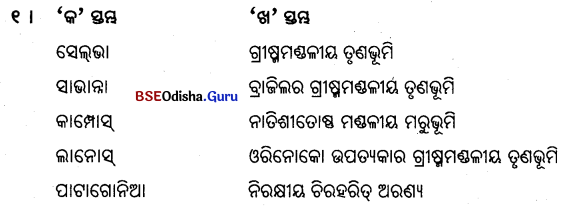

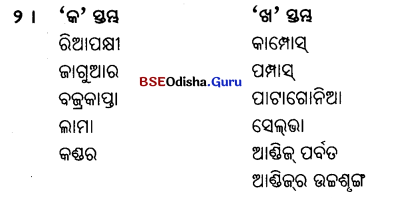
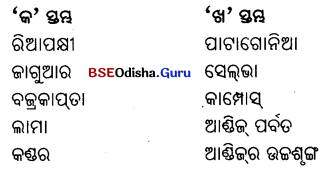
![]()
![]()
![]()
